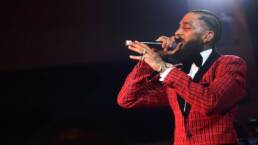Ermias Asghedom was born with a gift. A gift that he never took for granted and never gave up on, even when that meant that he had to go his own route. He did it with dedication, hard work, patience, and compassion for himself, his family, and his community. Our hearts are still broken. In the wake of this tragedy, we’re thankful for the #blkcreatives who’ve used their own gift to honor Hussle. As we continue to reflect on his impact, we’ll be updating this with reads that we find. We hope that in these words, you’ll find a little more peace to help you keep running your own marathon. He wouldn’t want you to quit.
May God bless his soul.
“I often think about a study released in 2017 by the Massachusetts Institute of Technology. It stated that it takes 20 years of nothing going wrong in a person’s life — perfect education, great college decisions, financial perfection — to escape poverty. Two decades. I think about what that means for people like Nipsey Hussle — black people who had to claw to survive and, no matter how much money he makes or how much good he does, the bullets still find him. He escaped poverty, but he couldn’t escape America.” – David Dennis Jr., We Lost More Than A Rapper Today: Nipsey Hussle Killed at 33
“In a way, we were lucky for a while. We never had to deal with losing our generation’s forward-thinking public figures to violence—until the death of Nipsey Hussle. The culture hasn’t suffered this type of loss since Pac got his wings. The same bullet that took Nipsey’s life, pierced our hearts. Losing him reintroduced a sense of hopelessness that runs parallel to the idea of success in Black America. If we’re not successful enough, we’ll be stuck at the bottom of the societal totem pole. If we’re too successful, we may lose our lives.” – Dev T Smith, The Effects of Losing Our Heroes: The Marathon Continues for Cassius Life
“Hussle had big dreams for his ’hood, and it’s not just tragic but unfair that he was cut down in the middle of revitalizing a community that raised him. By all accounts, Hussle was doing the right thing. If we remember anything about him, it should be that sense of aspiration.” – Gerrick D. Kennedy, Nipsey Hussle’s dreams were bigger than hip-hop
“In hip-hop, fairy tales don’t last. The culture is representative of the people who make it, who are themselves reflections of the grinding realities of black life in America. People are imperfect, and, when they’re black, they often die too soon. They leave work behind, and families, too. The violent masculinity that defined a generation of hip-hop never left the music, but for a while, it could abide sitting off in a corner.” – Jamilah King, Nipsey Hussle’s Death Brings a New Generation of Hip-Hop Heartbreak
“It wasn’t only that he was young and beloved or that he was a father of two who was in a relationship with actress Lauren London. Hussle (whose given name was Ermias Asghedom) was lauded through his life not just for his music but also for his service to the black community.” – Zeba Blay, Nipsey Hussle’s Work In The Black Community Went Deeper Than You Think
“Nipsey’s murder has me bleeding through my pores and it reminds me of my dad. It reminds me of Darius. It reminds me of Junie. It reminds me of my neighbor’s dead body being rolled out of the building as his mother’s wails floated across Fordham road.” T.Lloyd, Nipsey
“At a moment like this, it’s hard to know where to go next, how to give without becoming jaded or how to live without becoming cynical. There are no easy answers, but there is always the music. Nipsey was the uncommon rapper who made a point of owning his master recordings—a fact that he relentlessly trumpeted, as if he were trying to show his peers a way out—so, in his honor, let’s just play his songs. Let’s blare his redemption story, set to trunk-rattling bass and whining synths, like a blueprint that can inspire the next generation to fight in both the pursuit of a dream and on behalf of its own neighborhoods.” – Briana Younger, Nipsey Hussle Embodied the Best of Hip-Hop
“Those concerned with honoring his legacy have expressed, above all, a desire to remember Hussle’s commitment to preserving the communities he cared most about. The rapper’s father, Dawit Asghedom, worked at the Marathon Clothing store alongside his sons, but he was also invested in fighting for and with black people beyond Los Angeles and Eritrea. For volunteers such as Paulos, recognizing Hussle’s ties to L.A., and to black American history, is as key as remembering his Eritrean heritage.” – Hannah Giorgis, Nipsey Hussle’s Eritrean American Dream
“Alongside David Gross, the 33-year-old entrepreneur co-founded Our Opportunity, an investment coalition. The organization aims to develop high-quality, affordable mixed-use properties across multiple cities, pairing local stars with investors. The first property to kick off their venture was supposed to be a six-story residential unit built above the very same plaza he purchased and was subsequently killed in front of. The partnership with David Gross (also a black man), reflects Nipsey’s dedication to creating and sustaining black wealth in industries where minorities have traditionally been excluded, like land ownership and technology.” -Semmi W GO FIGURE: Nipsey Hussle’s Distribution of Wealth

About the Author
blkcreatives
Our community is a tribute to Black culture and creativity through content experiences that honor the past and nurture our present while we build toward the future.
